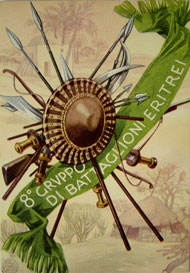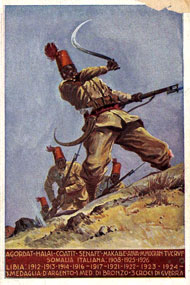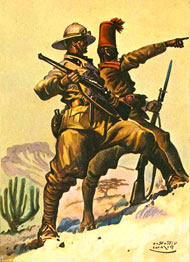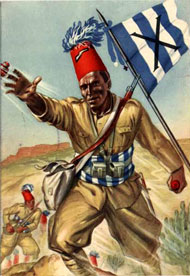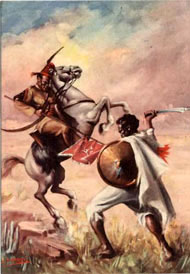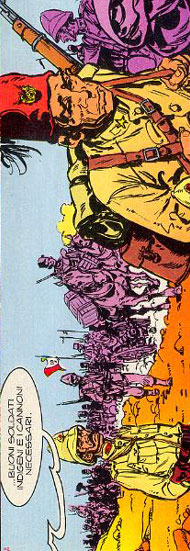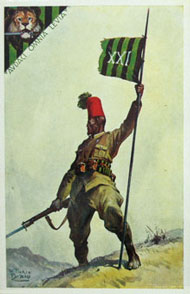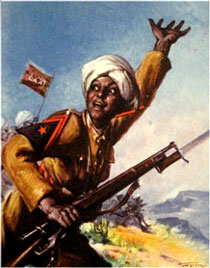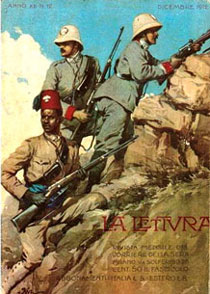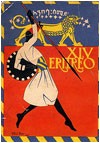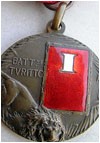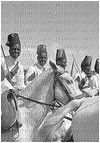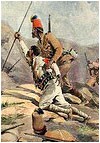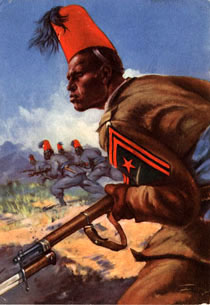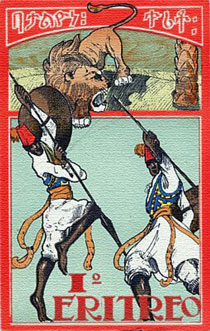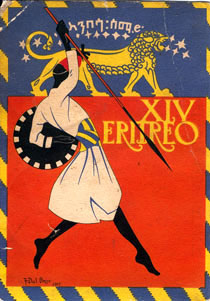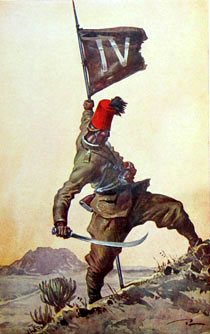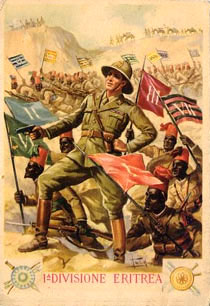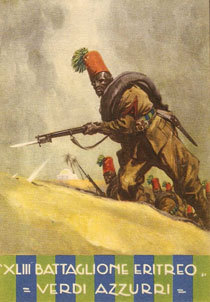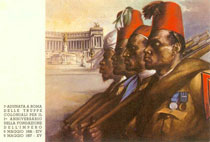Tributo a Hamid Idris Awate.Hamid Idris Awate Padre dell'Indipendenza Eritrea.
Tratto da: Wikipedia.
Quote <<<
Hamid Idris Awate (1910-1962) was a leader in early movements for Eritrean independence. Hamid fired the first shot against Ethiopian government forces in 1 September 1961 at Mount Adal. He went on to create the Eritrean Liberation Army (the armed wing of the Eritrean Liberation Front. He died in May 28 1962. He was wounded in the last battle he fought against the occupation forces; and it seems his death was due to battle wounds though some claim it was from natural causes. He was buried near Haykota, Gash Barka and a statue was erected by the Government of Eritrea in 1 September 1994 at his grave site.
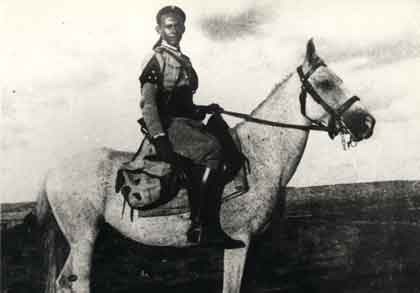
Click to Enlarge
Hamid Idris Awate was born at Gerset, located between Tessenei and Omhajer in southwestern Eritrea in the year 1910. His father was a peasant and known to own a rifle. Awate was trained by his father how to use that gun. At early age, he was a very skillful fighter who achieved great superiority in the usage of arms and developed a high knighthood skill that gained him the respect of his generation. Grown up in a locality that appreciates and values ethical principles based on honesty and faithfulness, Awate was known to be a man of moral values and a good example for them to follow, trust and was a great leader to be obeyed. Beside his fluency in Arabic, Tigre, Tigrina, Nara, Hedareb, and Kunama, Awate also spoke fluently Italian language.
In 1935, he was conscripted by the Italians to serve in the colonial army of the Eritrean Ascari. Beside his fluency in Arabic, Tigre, Tigrina, Nara, Hedareb, and Kunama, Awate learned the Italian language within short period of time and was sent to Rome for a course in military intelligence.
After returning from Italy, he was appointed as security officer in western Eritrea. Shortly after that, he served as deputy chief of the city of Kassala, Sudan and surroundings during the brief Italian occupation of that city in 1940/1941. He fought as an ascari in the Battle of Cheren and participated to the Italian guerrilla in Eritrea against the British and Ethiopians in WWII with the cavalrymen of Ali Gabre.At an early age, Awate was known among his friends and localities for his leadership capabilities and that was enhanced by his daily experience through the posts he held coupled with his national consciousness and awareness of his people’s problems and concerns. He was the most respected individual in the GashSetit and Barka areas. Many instances are told about his courage and how he was able to fight back when attacked by colonial police and assassins.
At the end of World War II, the British soldiers who were searching for arms in western Eritrea have, in the process, confiscated properties and killed cattle of the localities in GashSetit and Barka areas. In a self-defense reaction, Awate killed one of the soldiers. The British authorities accused Awate of a "crime" and forced him to live as a fugitive for some time. In the meantime, he was defending his people against the British plunders and other bandits who cross the border from the Sudan, shifta from other parts of Eritrea and Ethiopia who used to raid and loot the properties of people of the GashSetit and Barka areas as well.
Awate commanded a group of 40 gunmen who Actively operated against the British forces causing heavy loses among them. Aware of his great influence and role, the British colonial authorities decided to negotiate with Awate in order to avoid regrettable developments. A peace deal was reached and the violent clashes came to a stop.
When the Ethiopian government broke the terms of the UN Resolution of theFederation of Ethiopia and Eritrea, reducing Eritrea to status of an occupied country, the Eritrean people rose against it, showing their objections to that action by the Emperor’s government who adopted all means and ways of torture, intimidations, imprisonments, and killings. In the face of that, the Eritreans did not yield or surrender to the Ethiopian unilaterally annulling of the federation agreement.
Being a man of initiatives and combat, he didn’t leave events to take course according to the aggressor’s wish. He decided to take an action that would set history straight and restore stolen rights; but he was waiting for the right time to take the most important decision of his life.
Armed Struggle
In July 1960, in the city of Cairo, a group of young Eritrean students and intellectuals held a meeting and formed the Eritrean Liberation Front (ELF). The group consisted of the following names:
* Idris Mohammed Adem (the president of the National Assembly of Eritrea)
* Idris Osman Galaydos (a graduate of law school of Cairo University)
* Mohammed Saleh Hummed (a graduate of law school of Cairo University)
* Said Hussian (a student of Al-Az’har University in Cairo)
* Adem Mohammed Akte (a graduate from University of Cairo)
* Taha Mohammed Noor (a graduate from Italy)
Back home, the Ethiopian authorities were suspicious of Awate’s movements and activities, and were watching him closely.
In his book, Eritrea: destiny challenges, Hamid Saleh Turkey wrote about Awate’s beginnings and how the Ethiopian police forces planned to arrest Awate in his village in August 1961. Turkey explains that the Ethiopians deployed a large amount of police forces but their plans were foiled by an Eritrean nationalist within the Ethiopian police who informed Awate earlier of that plan. Awate then fled to Mount Adal located to the west of Agordat.
Awate’s decision to begin armed resistance was reached after a period of long deliberations with other nationalists. In an interview with Eritrea Al-haditha, issue #75, second year, pioneer Mohammed Al-Hassan Dohen, a long time friend of Awate and Awate's assistant when he was district chief, says: "In the year 1960, Idris Mohammed Adem sent a letter to Awate, the letter was written in Arabic… Hamid Awate told me that Idris Mohammed Adem was asking him to declare the armed struggle; but he was not ready for it at that time. After four months, Mohammed Al-Shiekh Daood came and asked Awate to declare the revolution. Awate agreed to lead the armed struggle and declare the revolution but asked for support. Mohammed Al-Shiekh Daood provided Awate with old arms, three five bullet rifles "abu khamsa" and gave him 300 Birr with sugar and tea. In addition, Ibrahim Mohammed Ali brought two rifles and myself owned a rifle. At the beginning we were only seven, then shortly our number had grown to be 13 fighters."
The Ethiopian authorities immediately responded to Awate's declaration. According to Awate’s contemporaries, a military unit in six trucks was sent to apprehend Hamid Awate but failed. The Ethiopians resorted to using different tactics to deal with Awate. Mohammed Al-Hassan Dohen indicates in his interview that Omer Hassano and Ejiel Abdulrahman did a last minute appeal to end Awate’s rebellion on August 1961. Awate responded saying: "If you want us to end our armed struggle, then you better lower the Ethiopian flag and raise up the Eritrean flag."
In September 1st 1961, mount Adal witnessed the birth of the long awaited event, the declaration of Eritrean revolution. Armed with strong belief in a just cause, Awate and the pioneers made history in Adal with very poor preparations in terms of arms, men, equipments and provisions. Nevertheless, they waged their first fierce battle against the Ethiopian occupation in mount Adal. The freedom fighters, the "RA’EEL" or pioneers, who accompanied Awate, were the followings:
* Abdu Mohammed Faid
* Ibrahim Mohammed Ali
* Hummed Gadef
* Awate Mohammed Faid
* Mohammed Beareg
* Mohammed Adem Hassan
* Saleh Giroog
* Ahmed Fekak
* Mohammed Al-hassan Dohen
* Adem Fegoorai
* Ali Bekhit
* Idris Mohmoud
* Omer Kerai
According to Awate’s contemporaries, the battle of Adal lasted for 7 hours from (6 am to 1 pm). Failing to crash the newly formed Eritrean Liberation Army (ELA), the Ethiopian forces retreated back and Awate ordered ELA fighters to withdraw first to Obel, then to Omer Siggo. The reaction to the battle of Mount Adal was great among Eritreans. The Eritrean people showed their support and solidarity with their revolution. The ELA pioneers received a warm welcome wherever they go. In his side, Mohammed Al-Shiekh Daood sold 30 camels to raise the needed amount of funds to supply the revolution and submitted that money to Awate.
Having received a stunning defeat in the battle of Adal, the Ethiopians were alarmed by Awate’s performance. They started massing their forces to carry out a large-scale attack. The Ethiopians were able to encircle ELA in the area of Omal where another fierce battle took place and resulted in the death of the first member of the ELA, Abdu Mohammed Faid.
However, the ELA was getting stronger as new well-trained fighters who served in the Sudanese military forces began to join the armed struggle. Kiboop Hejaj and Adem Gasear joined Awate and at later time, on February 17 1962, another group consisted of 11 joined as well. They were:
* Mohammed Idris Haj
* Omer Hamid Ezaz
* Taher Salem
* Osman Mohammed Idris (abu shenap)
* Ibrahim Mohammed Behdouri
* Mohammed Omer Abdella (abu tyara)
* Omer Mohammed Ali (Da’mer)
* Kisha Mohammed Kisha
* Mohammed Ibrahim
* Abdalla Idirs Adem
* Adem Gendifel
Awate led all the battles fought during his lifetime. Pioneer Abu Rigella reported that after the battle of Amnait, leader Awate and Mohammed Ibrahim Shandi got wounded. He says at the time, there were 11 military and civilian individuals who joined Awate, they swore in front of him, and declared their commitment to fight with him.
Abu Rigella attended the meeting when Awate was elected as a leader unanimously and Mohammed Idris Haj as his deputy. He said "Awate addressed the meeting saying: 'We are all Eritreans, we have to serve our country with honesty and sincerity, we are here to achieve a goal, and if there is anybody who may have individual ambitions other than the declared objective, then, he must leave now. We all have to show extreme commitment and dedication and carry out the commands and instructions of the leader, no matter how hard they are, for the cause of our country.'"
On May 27 1962, Awate drank milk for dinner, then soon told his unit that he was not feeling good. His condition began to deteriorate quickly. It is said that Awate called pioneer Kiboob Hajaj and gave him his gun to emphasize that the struggle should continue. On the morning of next day, Awate died from his battle wounds; his companions buried him secretly and did not reveal his death until four years later.
>>> Unquote
FELICE ANNIVERSARIO ERITREA.
Per Celebrazioni in Roma vedi sito: www.eritreaeritrea.com


